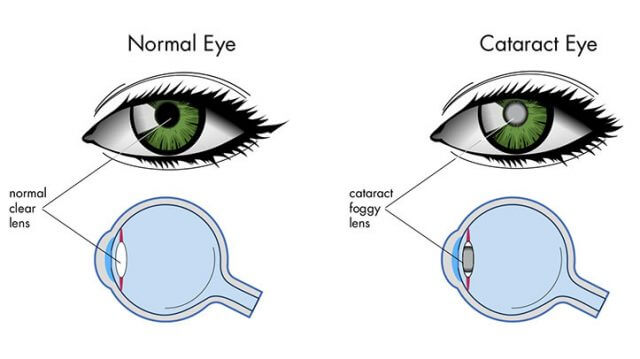
What Are Cataracts?
Cataracts are a common byproduct of the normal aging process, impacting over half of those aged 65 and older. As cataracts progress, vision becomes increasingly impaired. In its advanced stages a cataract may interfere with driving, watching movies, reading, and countless other activities that bring joy and meaning.
If left untreated, cataracts can lead to blindness. The only treatment is cataract surgery, where the hazy lens is removed and replaced with an intraocular lens (IOL), for clear vision and an improved quality of life.
What Causes Cataracts?
A cataract develops when protein starts to build up on the eye’s natural lens. As the lens becomes clouded, the amount of light reaching the retina is reduced. As the cataract progresses vision becomes blurry, leading to a sensation of looking through a dirty glass. One may also experience halos around bright lights, especially when driving.
Not all cataracts develop at the same pace, and certain risk factors, such as diabetes, smoking, and excessive alcohol use, can accelerate their development.
Symptoms of Cataracts
- Blurred vision
- Glare or halos around bright lights
- Faded colors
- Reduction or loss of depth perception
- Difficulty seeing at night or in dim light
- Frequent prescription changes
How Are Cataracts Treated?
The only treatment option is surgery. In the advanced stages of cataracts, the clouded lens is removed surgically and replaced with an intraocular lens (IOL). This is a quick and relatively painless procedure with a short recovery time.
There are several types of surgical procedures to remove cataracts, using various types of lenses and technology.
Can Cataracts Be Prevented?
Research shows that four powerful nutrients, Vitamin C, Vitamin E, lutein and zeaxanthin, can delay the onset and even decrease the risk of developing cataracts. These may protect against free radicals that attack the lenses of the eyes and contribute to cataract formation.
To preserve eye health and reduce the risk of cataracts, you’ll want to consume foods high in antioxidants and avoid processed, fried and junk foods.
Consult Dr. Tracy Phillips to learn about nutrition’s role in avoiding cataracts and which other steps you can take to maintain eye health.
Why Choose Bright Eyes Family Eye Care
If you experience any of the symptoms above and suspect you may have cataracts, please get in touch.
Dr. Tracy Phillips will assess your eyesight, your cataract and your physical health in our comfortable and well-equipped consulting rooms. If your deteriorating vision is affecting your work, hobbies or general well-being, our highly-trained and experienced Dr. Tracy Phillips will surgically replace the cloudy lens and restore clear vision.
Cataract surgery at Bright Eyes Family Eye Care is carried out in our ophthalmic operating rooms, fully equipped with advanced technology designed for the best clinical outcome and your safety. The operation is generally performed under local anaesthesia and only takes about 30 minutes to complete.
Our practice serves patients from Meridian, Collinsville, Marion, and Enterprise, MS and surrounding communities.









